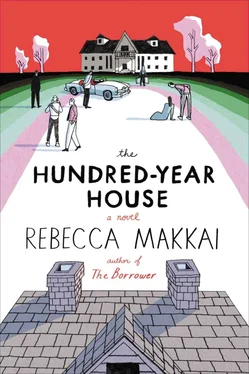And he has made the money that has made escape possible. Money is freedom, and he will explain it to her again, how this move is the triumph of money over fate and memory — which is, in turn, the triumph of hard work. For what is money but work made tangible and put into the bank?
He imagines he’ll take her back to Toronto just for the spring, for the packing of the house, and then they’ll stay in Chicago while the new estate is built. They might look, tomorrow, at the homes along Astor Street. Yesterday she said he wants to lock her up. And he said, “Would you rather I had your dear doctor shipped back in a barrel? I’m doing things the proper way.”
She looked at him level and said, “You may shut me in, but I can shut you out. There are two sides to every door, Augustus.” Her eyes were dark and sharp, and he felt, in that moment, like a lion tamer. Like a man who is only in charge because for now, for a few days more, the lions will still allow it.
He must forgive her. Billy Lambert had the prior claim on her heart. She cannot see Lambert for what he is, a fellow who deals in blood and urine all day, whose coat sleeves are always too short. And Augustus is not without sin.
Violet, maps of blue veins inside her wrists. But where can he follow them? Her eyes, too: windows to what, precisely? He thinks of the Sargent his father briefly owned — a small painting, not a great one, Mrs. de Somebody — how he himself, age twelve, would stare at her eyes, just dark and imprecise daubs of paint, and yet he knew her, he felt she might see that he alone loved her truly. And he knew what she was thinking, which changed daily. And now that he possesses a real woman, all her flesh, her eyes are nothing but opaque glass. He is slowly learning there might be greater honesty in art than in woman.
Ross has circled back. He says, “You couldn’t do better. It’s a fine plot.”
“I thought you’d be chalking it off somehow. Something official.”
Ross smiles, indulgent. “Why not break a branch to mark the front door?”
He shows Augustus the spot, and a scrubby little tree, leafless, doomed to die with its cousins when ground is broken. Augustus takes hold of a low branch, level with his own face, thin enough to snap but thick enough for the men to find again later.
“I ought to say auspicious words. Aren’t we meant to throw wine and salt?”
Ross raises his hand as if lofting a goblet. “A full moon on a dark night, and the road downhill all the way to your door!”
“That should do.” The branch breaks cleanly down with an echoing snap and hangs there, swinging, by a strip of skin. It is decided.
Ross says, “I’ll come back to mark it. A red ribbon.”
He pulls out his watch and shows it, grimacing, to Devohr. It is nearly half past three. The men sprint for the horses, and the horses, cold and unprepared, hurry as best they can back to town.
At the station, Devohr throws his bridle to Ross and dismounts and runs, but he sees, as he nears the platform, that the train is not inching to a stop but to a start. Men who have just disembarked hold their hats to their heads and wait to cross the track. And Violet is not on the bench where he left her. Instead there is a row of brown acorns down the bench arm, lined up and evenly spaced. She hoards small things, collecting them in columns and stacks: coins and pebbles and beetle wings. Once, he found it charming. Now he wonders what strange math she’s doing with the trinkets. The world is her abacus. She is calculating against him.
He searches frantically for the stationmaster, but then he sees, gliding past above, more slowly than if she were walking, Violet’s face in the window.
He shouts her name, and she looks down, but just a bit, and he isn’t sure she’s seen him. He refuses to run along the platform like a fool in a French novel. He can keep pace by walking, for at least a moment, and he thinks what can be done. He could take Ross’s horse, but it’s more than thirty miles to the city. He might track down an automobile. If nothing else, he can wire the Palmer House and make sure she arrives, make sure she’s seen to.
The train picks up a bit of speed, and he’ll trot, but just barely, not for much longer. Above him, she has put her white knuckles to the window and is knocking, slowly, listlessly. Looking straight at him now, with no expression at all. A cruel and pointless knocking: not to get out, and not to call him in. As if to demonstrate, simply, that the glass is thick.
He can almost hear the knocks, above the hiss of steam and the sound of the pistons. But he can’t, he knows he can’t. It’s in his head. The train only gets louder, and it only moves forward.
He will see her tomorrow, in the city, but this feels for some reason like the last glimpse of her he’ll ever get: staring through him, pale and inscrutable behind the glass.
Oh Violet, Violet, Violet! He wants to shout it, but he won’t.
Let me in.
Let me in.
Let me in.
This is a novel about, among other things, how much artists need a community. These are a few of the communities that have sheltered me during the writing of this book:
The wonderful people of Viking and Penguin: Kathryn Court, Lindsey Schwoeri, Scott Cohen, Veronica Windholz, Nina Hnatov, Nancy Resnick, and Kristen Haff; as well as Josh Cochran, who gave Laurelfield the red sky it needed.
The stupendous Nicole Aragi (the Queen of Pentacles) and Duvall Osteen.
A phalanx of early editors: the writers M. Molly Backes, Alex Christensen, John Copenhaver, Tim Horvath, Brian Prisco, and Emily Gray Tedrowe; and the readers (the world needs more readers like them) Shelley Gentle, Margaret Kelley, and Pamela Minkler.
The friends who let me bother them about technical details (and aren’t responsible for my errors): the writer David M. Harris on series ghostwriting; the writer Margaret Zamos-Monteith and the photographer Matthew Monteith on photographic history and 1920s darkrooms; Edward McEneely on WWII history (so much work for so few words!); and my social media hive-mind for everything from the drying time of oil paint to oak stump decomposition to pry bars.
The Sewanee Writers’ Conference, where the first chapters were encouraged, and where Christine Schutt’s kind read convinced me to keep working on this book.
The colleges on Chicago’s North Shore that have been kind enough, in the time since I originally drafted the first part of this novel, to welcome me to campus or let me teach. The college in this book is explicitly not based on any of those institutions.
The Ragdale Foundation and The Corporation of Yaddo, and everyone I met at both, whose work — from sonnets to paintings to smashed teacups — has inspired my last few years. What sort of world would this be, without refuges?
My family — Jon, Lydia, Heidi, Mom — who have been, variously, great editors and/or less requiring of diaper changes than they were three years ago.
Also, all five of the people I’ve forgotten.
This book started as a short story about male anorexia. I have no idea what the hell happened.












